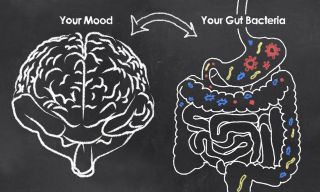Microbiome
Depression, the Gut Microbiome, and Vitamins
Explore the science of how gut microbes may affect metabolism and mood.
Posted May 27, 2024 Reviewed by Michelle Quirk
Key points
- The gut microbiome plays a role in depression.
- One possible mechanism is through vitamins that impact metabolism, mitochondrial function, and brain health.
- Understanding this science may lead to new treatment strategies for depression.

In recent years, the intersection of mental health and metabolic processes has gained significant attention, particularly the role of the gut microbiome and mitochondrial function in depression. A new systematic review, "Vitamin-mediated interaction between the gut microbiome and mitochondria in depression," delves into this complex interplay, offering a fresh perspective on how these systems might influence mental health through vitamin metabolism.
The Connection Between Depression, Mitochondria, and the Gut Microbiome
Depression is a pervasive mental health disorder affecting millions worldwide, often characterized by persistent sadness, loss of interest, and cognitive impairments. Traditional treatment approaches, including psychotherapy and pharmacotherapy, often yield suboptimal results, highlighting the need for more comprehensive therapeutic strategies.
Emerging evidence suggests that depression is not just a disorder of the brain but a systemic condition involving multiple biological pathways. One crucial aspect is mitochondrial dysfunction. Mitochondria, often known as the powerhouses of our cells, are responsible for producing the energy necessary for cellular functions, but they also control many other aspects of cellular function, as outlined in this post. In individuals with depression, mitochondrial energy production is often impaired, leading to reduced ATP levels and increased oxidative stress.
The Role of Vitamins and the Gut Microbiome
Vitamins play a pivotal role in maintaining mitochondrial function. B vitamins, in particular, are essential cofactors in the mitochondrial energy production process known as oxidative phosphorylation. Additionally, vitamins like C and E act as antioxidants, mitigating the harmful effects of reactive oxygen species produced during mitochondrial respiration.
Interestingly, the gut microbiome, a diverse community of microorganisms residing in the digestive tract, is a significant source of these essential vitamins. The gut bacteria can synthesize several B vitamins, vitamin K, and even vitamin C. This microbial vitamin production is crucial for maintaining adequate levels of these nutrients, especially when dietary intake falls short.
Linking Gut Health to Mental Health
The review highlights that changes in gut microbiome composition are commonly observed in individuals with depression. These alterations can lead to imbalances in vitamin production and availability, further exacerbating mitochondrial dysfunction. For example, reduced levels of gut bacteria that produce vitamins B6, B9, and B12 are associated with depression, potentially leading to impaired mitochondrial function and increased oxidative stress in the brain.
Moreover, the gut-brain axis, a bidirectional communication network between the gut and the brain, plays a critical role in regulating mood and behavior. The metabolites produced by gut bacteria, including vitamins, can influence brain function directly through the bloodstream or indirectly by modulating the immune system and inflammatory responses.
Implications for Treatment
Understanding the intricate relationships between the gut microbiome, mitochondria, and vitamins opens up new avenues for treating depression. Probiotic supplementation, aiming to restore a healthy gut microbiome, has shown promise in reducing depressive symptoms. These probiotics often include bacterial strains capable of synthesizing essential vitamins, potentially improving mitochondrial function and reducing oxidative stress.
Additionally, vitamin supplementation, particularly B vitamins and antioxidants like vitamins C and E, could support mitochondrial health and enhance the effectiveness of existing treatments. However, it is crucial to tailor these interventions to individual needs, considering factors such as dietary habits, existing gut microbiome composition, and specific vitamin deficiencies.
Conclusion
The research on the vitamin-mediated interaction between the gut microbiome and mitochondria in depression underscores the importance of a holistic approach to mental health that includes metabolic and nutritional considerations. By addressing these underlying biological mechanisms, we can develop more effective, integrative treatment strategies that not only alleviate depressive symptoms but also promote overall mental and metabolic health.
As we continue to unravel the complex web of interactions between our gut, brain, and cellular powerhouses, the potential for innovative therapies grows, offering hope for those struggling with depression and other related conditions. This integrative perspective not only enriches our understanding of mental health disorders but also paves the way for more comprehensive and personalized treatments.
References
Bisle, Ellen, Suchithra. Varadarajan, and Iris-Tatjana. Kolassa. “Vitamin-Mediated Interaction between the Gut Microbiome and Mitochondria in Depression: A Systematic Review Based Integrated Perspective.” Brain, Behavior, & Immunity - Health, May 10, 2024, 100790. https://doi.org/10.1016/j.bbih.2024.100790.




